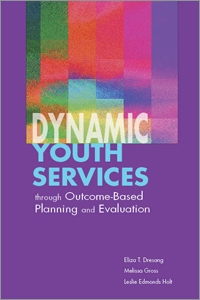Primary tabs
You don't need to be an ALA Member to purchase from the ALA Store, but you'll be asked to create an online account/profile during the checkout to proceed. This Web Account is for both Members and non-Members.
If you are Tax-Exempt, please verify that your account is currently set up as exempt before placing your order, as our new fulfillment center will need current documentation. Learn how to verify here.
- Description
- About the authors
- Reviews
Anyone picking up this book will find both an informative framework and very specific how-to-do-it tips for planning and evaluating dynamic public library youth services.—Eliza T. Dresang, Melissa Gross, and Leslie Edmonds Holt from the Introduction
Can library programs and services make a difference in your young patrons' lives? Measuring outcomes is the way to find out! Incorporating outcome-based planning and evaluation is critical when developing new programs and services.
In this step-by-step patron-centered guide, three experts who have conducted extensive research and piloted this outcome-based program for youth in the St. Louis Public Library, share their findings and proven strategies. Smart planning in conjunction with measuring outcomes will:
- Generate results that support funding—be it governmental or grant-based
- Maximize user benefits
- Get buy-in and participation from young library users
- Improve communications between staff and customers, and among staffUsing this method, and selecting the level of effort, allows libraries to refine existing services and make program improvements incrementally, based on what their audience wants and needs.
Using this comprehensive, flexible and easily-tailored guide, youth librarians and administrators in public libraries will be able to integrate outcome measures into regular library processes, gaining immense benefits with minimal effort.
Eliza T. Dresang
Eliza T. Dresang is professor in the School of Information Studies at Florida State University. She served as Director of Library and Technology Services in the Madison, Wisconsin School District for 16 years.
Melissa Gross
Melissa Gross is a professor in the School of Information at Florida State University and past president of the Association for Library and Information Science Education (ALISE). She received her PhD in library and information science from the University of California, Los Angeles (UCLA) in 1998, received the prestigious American Association of University Women Recognition Award for Emerging Scholars in 2001, and received the ALISE Award for Professional Contribution to Library and Information Science Education in 2019. Dr. Gross teaches and conducts research in the areas of information-seeking behavior, information literacy, library program and service evaluation, and information resources for youth.
Leslie Edmonds Holt
Leslie Edmonds Holt, past president of ALSC, has 25 years of experience working in public libraries, including a stint as Director of Youth Services and Community Relations at the St. Louis Public Library.
"The authors lead their colleagues in youth services through an assessment strategy that had success for the Youth Services Department of the St. Louis Public Library. Using a new paradigm of planning--Project CATE: Children's Access to and Use of Technology Evaluation--they advise librarians to begin with desired outcomes based upon community analysis and market research and demonstrate the necessity for focus groups. A bibliography and charts are included, and sample data-collection instruments are provided in an appendix. The book gives a clear and concise method for conducting an assessment to refine services and is recommended for public libraries and academic libraries with library and information science programs."
--Booklist



